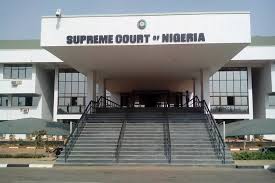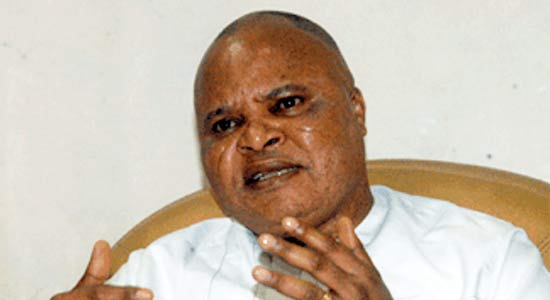COURTROOM NEWS 23/06/2022
Declare FG As The Appropriate Body To Pay Pension Of Retired Judges — AG Abia Prays Supreme Court

The Attorney General of Abia State has instituted a suit at the Supreme Court seeking the Court`s interpretation of Sections 6, 81(3), 84(1) – (4) & (7) and 291 of the Constitution of the Federal Republic of Nigeria, 1999 [as amended] and Item 44 of the Exclusive Legislative List, Part I of the Second Schedule to the Constitution thereof, as it relates the payment of the pensions of Judges listed under section 84(4) of the Constitution.
The suit which was instituted vide an Originating Summons is between the Honourable Attorney General of Abia State v. Honourable Attorney General of the Federation.
In the Originating summons cited by The Lawyer, dated 1st Day of April, 2022, and signed by Tawo E. Tawo, SAN and Aikhunegbe Anthony Malik, SAN on behalf of the Plaintiff nominated the following questions for determination by the Supreme Court:
1. Having regard to the clear, lucid and unambiguous provisions of Sections 6, 81(3), 84(1) – (4) & (7) and 291 of the Constitution of the Federal Republic of Nigeria, 1999 [as amended] and Item 44 of the Exclusive Legislative List, Part I of the Second Schedule to the Constitution thereof, whether the retirement benefits of the Judicial Officers listed in Section 84(4) of the Constitution, including but not limited to their pensions and gratuity, are or form part of the recurrent expenditure chargeable upon the consolidated fund of the Federation.
2. If the answer to Question 1 supra is in the affirmative, whether it is the responsibility of the Federal Government of Nigeria to provide, cater for or pay the retirement benefits of the Judicial Officers listed in Section 84(4) of the 1999 Constitution, having regard to the Sections 6, 81[3], 84(1-4) & (7) and 291 of the Constitution and the decision of this Honourable Court in SC/CV/655/2020, Between Honourable Attorney General Abia State & 35 Ors. vs. Honourable Attorney General of the Federation, delivered on 11th February, 22.
Upon the determination by the Supreme Court of the questions for determination before the Court, the plaintiff prayed the Court for the following reliefs:
1. A DECLARATION that by virtue of the clear and unambiguous provisions of Sections 6, 81[3], 84(1- 4) & (7) and 291 of the Constitution of the Federal Republic of Nigeria [1999 (as amended) and Item 44 of the Exclusive Legislative List, Part I, Second Schedule to the Constitution thereof, the retirement benefits for Judicial Officers, including but not limited to pensions and gratuities, are or form part of the recurrent expenditure of judicial officers stated or mentioned in Section 84(4) of the Constitution chargeable upon the Consolidated Revenue Fund of the Federation.
2. A DECLARATION that by virtue of the clear provisions of Section 6, 81(3) and 84 (7) of the Constitution of the Federal Republic of Nigeria, 1999 [as amended] and the decision of the Supreme Court in SC/CV/655/2020, between Honourable Attorney General Abia State & 35 Ors. vs. Honourable Attorney General of the Federation, delivered on 11th February, 2022, it is the responsibility, obligation and or duty of the Federal Government of Nigeria to provide, cater for or pay the retirement benefits, including but not limited to pensions and gratuities, of judicial officers listed in Section 84(4) of the 1999 Constitution.
3. A DECLARATION that the failure, refusal and neglect of the Defendant to take up, pay or otherwise bear the responsibility, obligation or duty of paying the retirement benefits of all the judicial officers listed in Section 84(4) of the Constitution since May 29, 1999, is unconscionable, condemnable, unjustifiable, actionable and immoral.
4. AN ORDER compelling the Defendant to henceforth, take up the responsibility and/or duty of paying and/or funding the retirement benefits of all judicial office holders through the National Judicial Council [NJC], same being part of recurrent expenditure by virtue of Sections 6, 81(3), 84(1) – (4) & (7) and 291 of the Constitution of the Federal Republic of Nigeria, 1999 [as amended], Item 44 of the Exclusive Legislative List, Part I Second Schedule to the Constitution and the decision of the Supreme Court in SC/CV/655/2020, between Honourable Attorney General Abia State & 35 Ors. vs. Honourable Attorney General of the Federation, delivered 11th February, 2022.
The originating summons was supported with a 14-paragraph affidavit – where the plaintiff alleged that the Federal government since May 29th, 1999 shouldered the responsibility of payment of recurrent expenditure of justices of the Abia State High Court and the Customary Court of Appeal Abia State through the National Judicial Council (NJC) but that the Federal government had not at any time through the NJC paid any form of retirement benefits of the said Justices, and that it had been the Abia State Government that had been taking up this responsibility – and a written address. In their written address, the plaintiff argued relying on case laws that it was trite law that when words of statutes are clear and unambiguous, they ought to be accorded their literal interpretation and in the instant case, section 85 (2) & (4) mandates that the payments of recurrent of expenditure of the President, Chief Justice of Nigeria, Justice of the Supreme Court, President of the Court of Appeal, Justice of the Court of Appeal, Chief Judge of the Federal High Court, Judge of the Federal High Court, Chief Judge and Judge of the High Court of the Federal Capital Territory Abuja, Chief Judge of a State, Judge of the High Court of State, Grand Kadi and Kadi of the Sharia Court of Appeal of the Federal Capital Territory Abuja, President and Judge of the Customary Court of Appeal of the Federal Capital Territory Abuja, Grand Kadi and Kadi of the Sharia Court of Appeal of a State, President and Judge of a Customary Court of Appeal of a State be an exclusive reserve of the Federal Government from the consolidated revenue of the Federation.
The plaintiff went on to argue that there ought to be combined reading of the relevant sections of the constitution, and that such a combined reading will establish that the remunerations, salaries and allowances on the one hand and the pensions, gratuities and other like benefits which falls under recurrent expenditure on the other hand are all charged to the Consolidated Revenue Fund of the Federation and paid by the Federal government. It was the reasoning of the plaintiff that the constitution could not place on the Federal government the payment of all recurrent expenditure of the underlisted justices and thereafter, when these justices retire, place the burden of paying their retirement benefits on the State, as if this was the case the State would have been allowed to negotiate and pay the renumeration of judicial officers in their respective States.
Relying on these arguments, the plaintiff submitted that the payments of retirement benefits of the underlisted justices was under the responsibility of the Defendant and prayed that the Court granted all its reliefs sought.
The Supreme Court is yet to fix a date for the hearing of the case.



